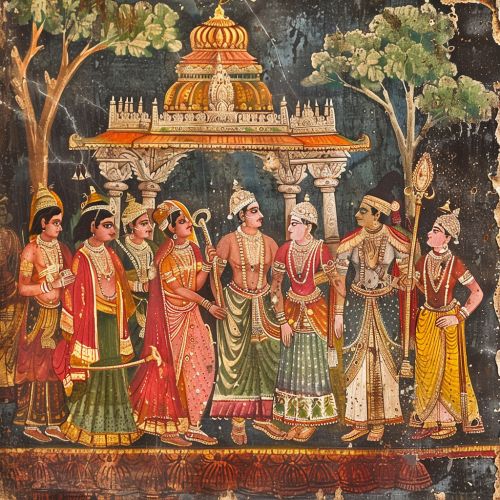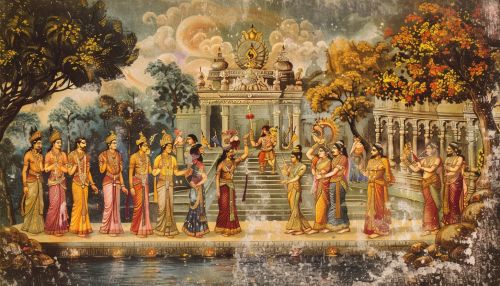Kushadhwaja
Early Life and Background
Kushadhwaja, also known as Kushadwaja, is a significant figure in Hindu mythology, particularly within the Ramayana epic. He is often recognized as the younger brother of King Janaka, the ruler of Mithila, and thus, the uncle of Sita, the wife of Rama. Kushadhwaja's lineage traces back to the Ikshvaku dynasty, a prominent dynasty in ancient Indian history.
Family and Lineage
Kushadhwaja was born to Hrasvaroma, the king of Mithila, and belonged to the illustrious lineage of the Ikshvaku dynasty. His brother, Janaka, is celebrated for his wisdom and devotion to dharma. The family is revered for their adherence to Vedic principles and their patronage of spiritual and philosophical discourses.
Role in the Ramayana
Kushadhwaja's role in the Ramayana is pivotal, albeit less prominent compared to other characters. He is primarily known for his daughters, Mandavi and Shrutakirti, who married Bharata and Shatrughna, respectively. These marriages further solidified the bonds between the families of Rama and Janaka, symbolizing the unity and harmony within the royal families.


Political and Social Influence
As a member of the royal family of Mithila, Kushadhwaja held significant political and social influence. His role extended beyond familial ties, contributing to the governance and administration of the kingdom. His wisdom and counsel were highly valued by his brother Janaka, and he played a crucial role in maintaining the stability and prosperity of Mithila.
Philosophical and Spiritual Contributions
Kushadhwaja, like his brother Janaka, was deeply rooted in Vedic traditions and philosophies. He was known to engage in spiritual discourses and was a patron of various sages and scholars. His contributions to the spiritual and philosophical landscape of Mithila were significant, fostering an environment of learning and enlightenment.
Legacy and Cultural Impact
The legacy of Kushadhwaja is preserved through various texts and traditions within Hindu culture. His daughters' marriages to Bharata and Shatrughna are celebrated events in the Ramayana, symbolizing the virtues of duty, loyalty, and familial bonds. Kushadhwaja's life and contributions continue to be revered in the context of Hindu mythology and cultural heritage.
